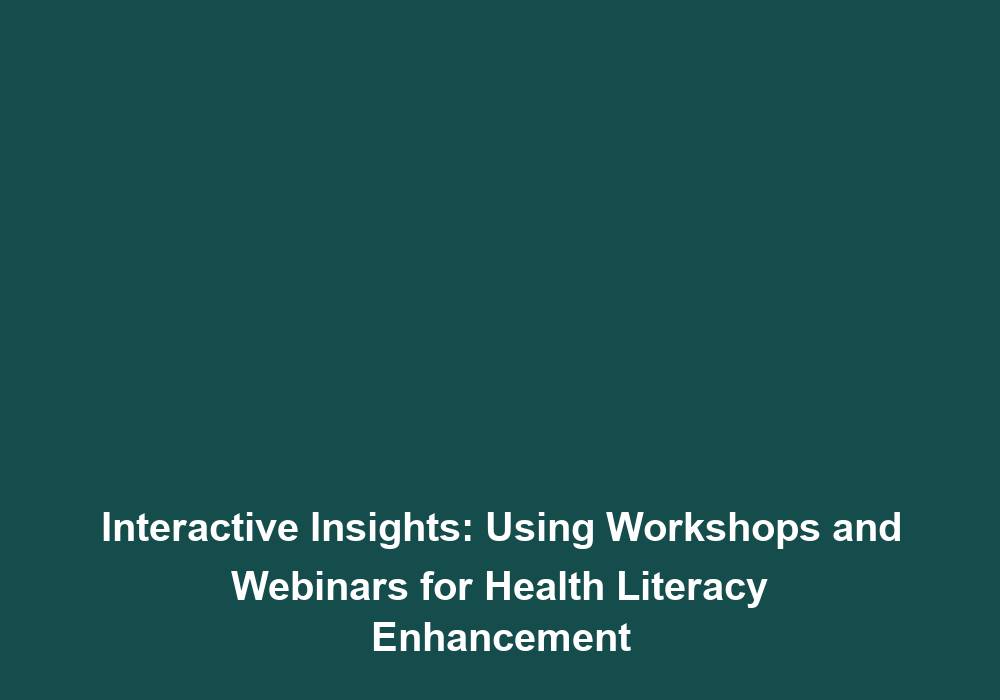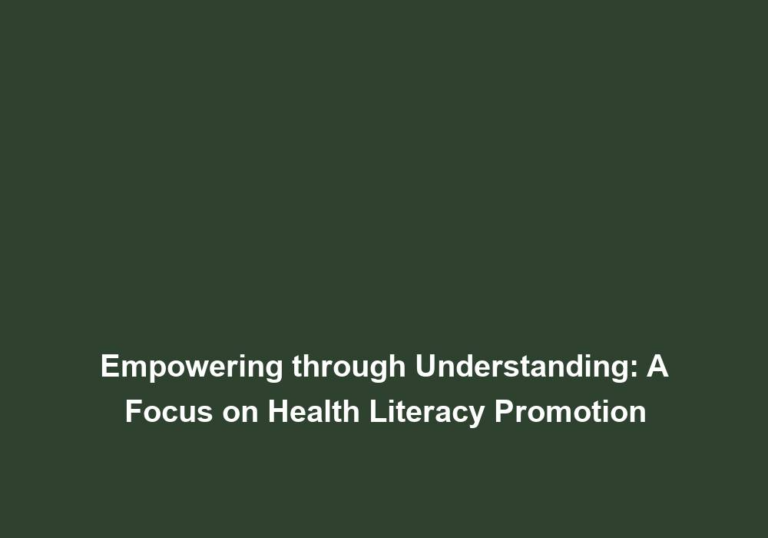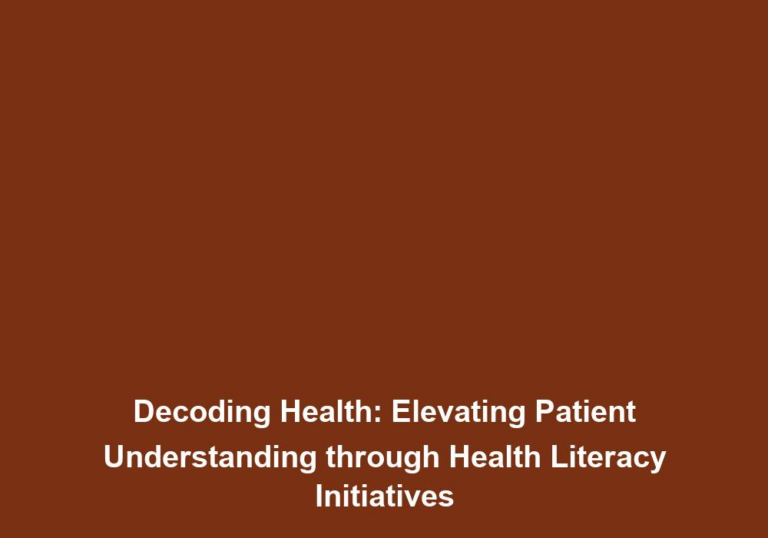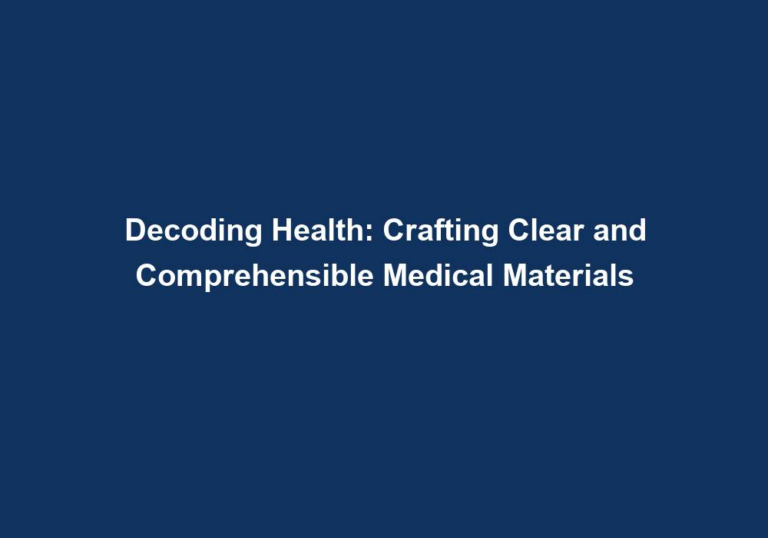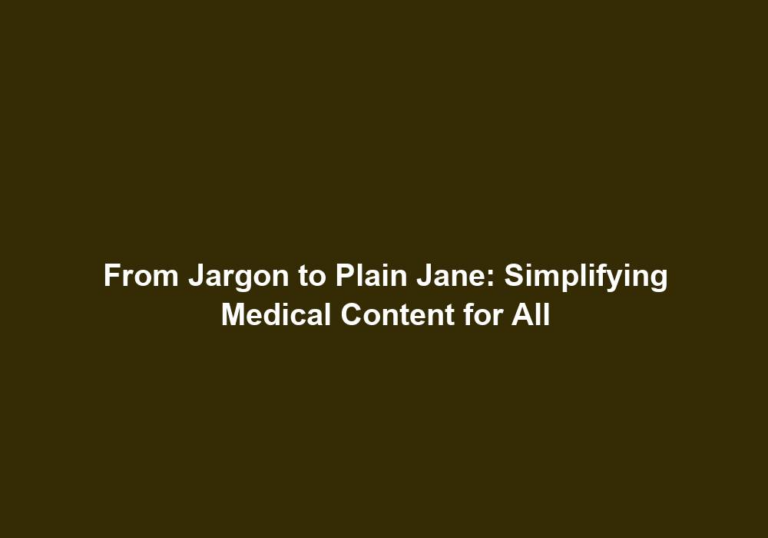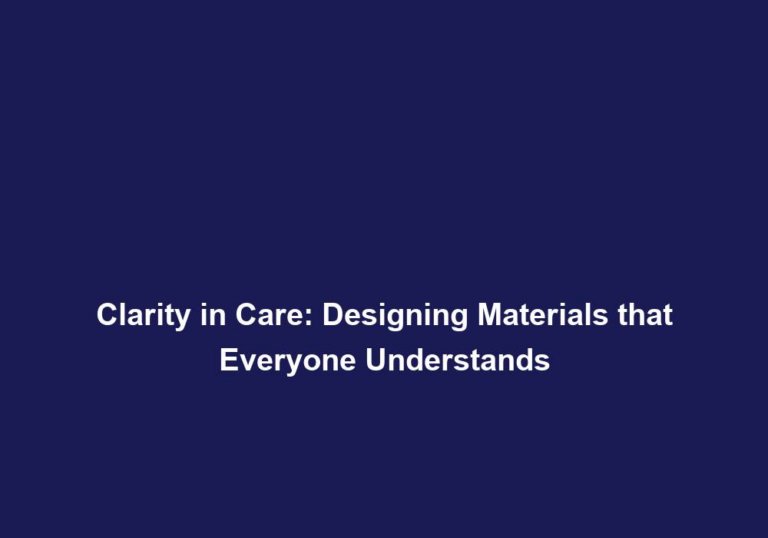Interactive Insights: Using Workshops and Webinars for Health Literacy Enhancement
In today’s digital era, workshops and webinars have emerged as powerful tools for enhancing health literacy among individuals. With the rapid development of technology and the internet, these interactive platforms provide unique opportunities to educate and engage people in understanding health-related topics more effectively. In this article, we will explore the benefits of using workshops and webinars for health literacy enhancement and how they can contribute to a more knowledgeable and empowered society.
The Power of Workshops
Workshops are interactive, hands-on sessions that provide participants with the opportunity to actively engage in learning and acquire practical skills. When it comes to health literacy, workshops offer a dynamic and immersive environment for individuals to deepen their understanding of various health topics. Here are some key benefits of using workshops for health literacy enhancement:
- Active Learning: Workshops encourage active participation from attendees, fostering a more engaging learning experience. Participants can interact with the facilitator and other attendees, ask questions, and share their own experiences and perspectives. This collaborative approach facilitates better comprehension and retention of health information.
Moreover, active learning promotes critical thinking and problem-solving skills. Through group activities and discussions, participants can analyze real-life scenarios and apply their knowledge to practical situations. This hands-on approach allows individuals to develop a deeper understanding of health concepts and build confidence in managing their own health or providing care to others.
- Tailored Content: Workshops can be specifically designed to address the unique needs and interests of the target audience. Whether it’s educating patients about a specific medical condition or providing healthcare professionals with updated knowledge on emerging treatments, workshops allow customization of content to ensure maximum relevance and impact.
Tailoring the content of workshops involves conducting thorough research on the target audience. By understanding their knowledge gaps, preferences, and learning styles, workshop facilitators can create highly targeted sessions that resonate with participants. This customized approach not only enhances engagement but also increases the likelihood of participants retaining and applying the information they have learned.
- Practical Application: Workshops often involve practical exercises, simulations, and case studies, enabling participants to apply their newly acquired knowledge in real-world scenarios. By engaging in hands-on activities, attendees gain valuable skills and confidence in managing their health or providing better care to patients.
Practical application is a crucial aspect of health literacy enhancement. It allows participants to bridge the gap between theory and practice, transforming knowledge into actionable steps. Through role-playing exercises or simulated patient interactions, individuals can develop the necessary skills to make informed decisions, communicate effectively, and navigate the healthcare system. This experiential learning approach fosters a deeper understanding of health concepts and promotes self-efficacy.
- Building Networks: Workshops bring together individuals with similar interests and concerns, creating opportunities for networking and collaboration. Participants can learn from each other’s experiences, share resources, and establish supportive connections. This sense of community fosters ongoing learning and support beyond the workshop itself.
The power of networking in workshops cannot be underestimated. By connecting with peers, participants can broaden their perspectives, gain new insights, and access valuable resources. Collaborative learning environments enable the exchange of ideas, best practices, and success stories, fostering a culture of continuous improvement. These networks can extend beyond the workshop duration and serve as a source of ongoing support and motivation for individuals in their health literacy journey.
The Impact of Webinars
Webinars, short for web-based seminars, are online presentations that allow for real-time interaction between the presenter and the audience. They have gained significant popularity in recent years and have become invaluable tools for health literacy enhancement. Here’s why webinars are so impactful:
- Accessibility: Webinars break down geographical barriers and provide access to health information regardless of an individual’s location. People from remote areas, individuals with mobility limitations, and busy professionals can all benefit from participating in webinars without the need for physical presence. This makes health literacy education more inclusive and equitable.
Webinars eliminate the constraints of physical attendance, making health education accessible to a wider audience. Individuals who reside in remote areas or have limited access to healthcare facilities can now access valuable information from the comfort of their homes. Moreover, webinars cater to the needs of busy professionals who may not have the time to attend in-person workshops. This inclusivity ensures that individuals from diverse backgrounds and circumstances have equal opportunities to enhance their health literacy skills.
- Convenience: Webinars offer the flexibility of attending sessions from the comfort of one’s own home or office, eliminating the need for travel and saving valuable time. Participants can join live webinars or access recorded versions at their convenience, allowing for personalized learning schedules.
The convenience factor of webinars cannot be overstated. Participants have the freedom to choose the most suitable time and place for their learning experience. This flexibility eliminates the barriers associated with traditional in-person workshops, such as travel time, scheduling conflicts, and geographical limitations. Additionally, recorded webinars can be accessed later, allowing individuals to revisit the content and reinforce their understanding whenever needed.
- Engagement Features: Webinar platforms often include features such as live chat, polls, and Q&A sessions. These interactive tools enable real-time engagement between presenters and attendees, promoting active participation and knowledge exchange. Participants can ask questions, clarify doubts, and engage in discussions, enhancing their overall learning experience.
The interactive nature of webinars enhances participant engagement and promotes active learning. Live chat features allow attendees to interact with the presenter and other participants, providing opportunities for real-time knowledge sharing and collaboration. Polls and Q&A sessions encourage audience involvement, ensuring that their specific concerns and interests are addressed. This two-way communication fosters a sense of inclusivity and empowers individuals to actively participate in the learning process.
- Expert Insights: Webinars bring together subject matter experts from various fields, providing access to diverse perspectives and up-to-date information. Attendees can benefit from the expertise of renowned healthcare professionals, researchers, and industry leaders who share their insights and best practices. This exposure to expert knowledge contributes to a more comprehensive understanding of health-related topics.
Webinars offer a unique opportunity to learn directly from experts in the field. By featuring renowned healthcare professionals and thought leaders as presenters, webinars provide attendees with valuable insights and the latest advancements in healthcare. Participants can gain a broader perspective on health-related topics, stay updated with current research, and benefit from evidence-based practices. The expertise shared in webinars empowers individuals to make informed decisions and take proactive steps towards better health outcomes.
Best Practices for Effective Workshops and Webinars
To ensure the success of workshops and webinars in enhancing health literacy, it is essential to follow some best practices. Consider the following guidelines when planning and conducting interactive sessions:
- Define Clear Objectives: Clearly define the learning objectives of the workshop or webinar. What specific outcomes do you want participants to achieve? Setting clear goals helps in designing relevant content and measuring the effectiveness of the session.
Defining clear objectives is the foundation of a successful workshop or webinar. It provides a roadmap for content development, ensuring that the session remains focused and impactful. By clearly communicating the desired outcomes, facilitators can align the learning experience with participants’ needs and expectations. This clarity also enables the evaluation of the session’s effectiveness and the measurement of knowledge gain.
- Engage the Audience: Use interactive techniques to actively engage participants throughout the session. Incorporate group activities, discussions, and multimedia elements to maintain interest and promote knowledge retention.
Engaging the audience is crucial to maximize the effectiveness of workshops and webinars. Interactive techniques, such as group activities and discussions, encourage active participation and foster a collaborative learning environment. By incorporating multimedia elements, such as videos or infographics, facilitators can cater to different learning styles and enhance participants’ understanding and retention of information. This interactive approach creates a more memorable and impactful learning experience.
- Use Visual Aids: Visual aids such as slides, infographics, and videos enhance comprehension and make complex concepts more accessible. Use a combination of text and visuals to support learning and create a visually appealing presentation.
Visual aids play a vital role in workshops and webinars, as they facilitate information processing and aid in knowledge retention. By using well-designed slides, infographics, or videos, presenters can simplify complex concepts, enhance comprehension, and make the content more engaging. Visual aids should be visually appealing, easy to read, and aligned with the overall theme of the session. A combination of text and visuals ensures that different types of learners can benefit from the presentation.
- Provide Resources: Offer supplementary resources such as handouts, reference materials, and links to trusted online sources. These resources allow participants to further explore the topic and reinforce their understanding after the session.
Providing supplementary resources is essential for supporting participants’ continued learning and knowledge consolidation. Handouts, reference materials, and links to trusted online sources enable individuals to delve deeper into the topic and access additional information at their own pace. These resources serve as valuable references for future use and reinforce the concepts covered in the workshop or webinar. By offering easily accessible and reliable resources, facilitators can empower participants to continue their health literacy journey beyond the session.
- Collect Feedback: After the workshop or webinar, collect feedback from participants to assess their satisfaction and gather insights for improvement. Use this feedback to refine future sessions and ensure ongoing quality.
Collecting feedback is a crucial step in improving the effectiveness of workshops and webinars. By soliciting feedback from participants, facilitators can gather valuable insights about the strengths and areas for improvement of the session. This feedback can be collected through online surveys, post-session discussions, or questionnaires. Analyzing the feedback allows facilitators to make necessary adjustments, refine the content, and enhance the overall learning experience. Continuous improvement based on participant feedback ensures that future sessions meet the evolving needs of the audience.
By implementing these best practices, workshops and webinars can become powerful tools for health literacy enhancement, empowering individuals to make informed decisions about their health and well-being.
In conclusion, workshops and webinars provide interactive and accessible platforms for enhancing health literacy. Through active learning, tailored content, practical application, and the power of online engagement, these methods foster a more knowledgeable and empowered society. By utilizing the best practices outlined above, healthcare professionals, educators, and organizations can leverage workshops and webinars to promote health literacy and contribute to improved health outcomes for individuals and communities.

